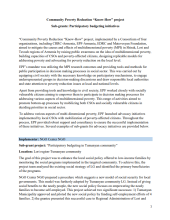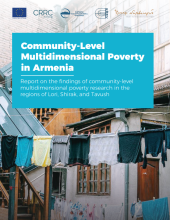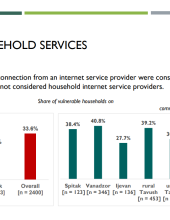
Armenia is a landlocked and economically disadvantaged country with weak economy and industry. There are numerous factors that have caused this blockade among which we can mention unfavorable geographic location with no entry to a sea and the 2 neighboring countries that have closed their borders with Armenia and with whom Armenia has no diplomatic relations. All these factors have had their negative impact on the development perspective and economy shaping a high level of poverty across the country. Poverty is especially definitive to regions and villages of Armenia due to lack of proper infrastructures and weakly developed and resourceless LGs. All these issues have had deep consequences on well-being of the citizenry, resulting in underdeveloped and abandoned communities, shortage of vacancies and improper level of education and health.
The outbreak of Covid-19 and the lockdown imposed by the government have deepened the level of poverty across the country, especially in regions of Armenia. According to statistics, Tavush, Lori and Shirak, the Northern bordering regions are the most economically disadvantaged regions of Armenia. Researches and data received from the Armenian Statistical Committee show that multidimensional poverty and its effects are not properly examined and addressed. The issue has become more critical after the 44-day armed conflict escalated around Nagorno-Karabakh between Armenia and Azerbaijan. During and after the armed actions, Armenia had to host a huge number of displaced people from Nagorno-Karabakh. Being heavily influenced by these circumstances, the poverty mitigation has become a top priority for communities of the country. Solution of this situation is to pilot a well-organized project in the most underdeveloped communities which will have chances to be replicated in other regions too.
The “Community Poverty Reduction “Know-How”” project aims to address and tackle multidimensional poverty through a series of interlinked and incremental activities. The project will be implemented by four consortium members: CRRC-Armenia Foundation (the lead), Economic Development and Research Center (EDRC), Eurasia Partnership Foundation (EPF) and the Matevosyan Foundation, with the support of the European Union.
The goal of the project is the following: Focusing on solutions that address the causes and effects of poverty and inequality through enhancing civil society capacity to revitalize public discourse on inequality and poverty, advocate for community-level poverty reduction policies, develop replicable community-based services and practices for tackling multidimensional poverty, and increase the ability of vulnerable groups to manage economic and social risks and shocks due to Covid19 crisis.
The project comprises 3 interlinked components:
- Baseline studies and research
At the onset of the project research activities will be carried out by CRRC to assess the level of multidimensional poverty and inequality in the three target regions. Simultaneously, budget analyses of state and community based programs will be conducted by EDRC to assess the effectiveness and impact of the state policy interventions on the well-being of vulnerable community groups. Mapping of existing social services will follow in order to identify current initiatives designed for social service recipients. As a result, policy recommendations will be brought out to present locally based CSOs, state officials and policy makers. Once comprehensive data is gathered and digested throughout the desk research, the most relevant research findings will be furtherly used to consult the Matevosyan Foundation and EPF in conducting field activities in Lori, Shirak and Tavush regions.
- Awareness raising and capacity building
Under this component series of capacity building and thematic trainings will be conducted by EPF and EDRC for CSOs and vulnerable groups. The thematic area includes policy development and monitoring, community budget formulation, and training on how to mitigate risks related to poverty and vulnerability. As a result of this activity, CSOs will be capacitated to understand and analyze the pattern of multidimensional poverty and actively participate in policy development and monitoring. Apart from the aforementioned, Matevosyan Foundation will organize data exhibition to bring the spotlight on the highlights of the research findings.
- Community mobilization and policy advocacy
The previous two actions of the project will consecutively trigger community mobilization and policy advocacy campaigns through engagement of CSOs and vulnerable groups. To achieve this, sub-grant scheme will be announced by EPF to support the establishment of locally-based social initiatives to tackle poverty issues. Awarding of sub-grants and establishment of initiative groups is one of the key actions of the project after which policy dialogue, lobbying and advocacy campaigns will be developed by them to address policy and legal improvements.
Strengthened capacities of local NGOs, vulnerable groups, and launched advocacy campaigns will result in improvement of poverty reduction policies and adoption of more productive and inclusive strategies by the state institutions.
***
“The ‘Community Poverty Reduction Know-How’ project is implemented with the financial support of the European Union by a consortium of CRRC-Armenia, EPF, EDRC, and Matevosyan Foundation.”



